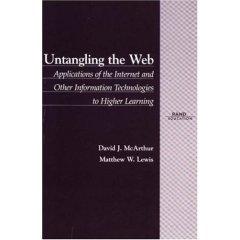| 2020ok Directory of FREE Online Books and FREE eBooks |
Free eBooks > Business & Investing > Reference > Education > Untangling The Web: Applications Of The Internet And Other Information Technologies To Higher Learning
Untangling The Web: Applications Of The Internet And Other Information Technologies To Higher Learningby David J. Mcarthur And Matthew W. Lewis  Download Book (Respecting the intellectual property of others is utmost important to us, we make every effort to make sure we only link to legitimate sites, such as those sites owned by authors and publishers. If you have any questions about these links, please contact us.) link 1 About Book Book Description This report analyzes the role of the emerging global information infrastructure in helping higher-education institutions to improve learning and teaching, improve the creation of infrastructional and learning materials, create educational communities, compete with new providers, and address policy and planning issues. From the Publisher In just a couple of years, the Internet and World Wide Web havetransformed communication, scholarship, and business. But whatpotential do they hold for changing higher education-the placewhere this technology, once called the ARPANET, originated overtwenty years ago? Will they help universities reduce costs in the faceof often-dramatic budget reductions? Will distance learning(dissemination of educational material and information throughelectronic and hardcopy media, rather than face-to-face), digitallibraries, and new "virtual universities" make education available tostudents cheaply, and at any place or time? Or might the Webthreaten higher education more than save it? Will nimble for-profitproviders, who now increasingly use the Internet to deliver corporatetraining, soon turn to the education market and compete with traditionalcolleges and universities? If so, how might higher-educationinstitutions respond to this challenge? How will they acquire thehardware and software needed to offer high-quality educational servicesat prices they can afford? And how can faculty quickly adapt tostyles of teaching and learning that, for example, emphasize interactivementoring instead of traditional lectures?This report is the product of a small RAND study that attempted toframe and develop some answers to these questions. It is intendedboth as a broad review of ongoing and planned applications of theInternet and Web in higher education, and as an analysis of keytechnical and educational issues-as well as broader social issuesthat these applications highlight. We hope that this report willstimulate discussions regarding the costs and benefits of Web technologiesin learning, the different models these technologies offer for providing education, and the changing relationships between traditional institutions of higher education and a new generation of providers. This paper was completed in fall of 1996 (with minor updates prior toofficial RAND publication in early 1998) and reflects the state of Web-basedtools and practices in higher education at that time. Becausethe world of cyberspace is evolving rapidly "virtual" generations aremeasured in months, not years-examples, Web links, and even institutionsdiscussed in the paper may be quickly out-of-date or extinct.The central ideas and issues, however, should have a muchlonger life, hopefully framing discussions until the Millennium andbeyond.Decisionmakers who are concerned with these technical and policyissues are a main audience for this report. It should also be of interestto academic, research, and business professionals who are concernedwith applications of information technology in education andthe social implications of those applications.The study was sponsored by the California Education Round Table.It was carried out under the auspices of RAND Education, directed byDr. Roger Benjamin.For further information on this study, contactRoger Benjamin (Roger_Benjamin@rand.org),Matthew Lewis (Matthew_Lewis@rand.org), orDavid McArthur (David_McArthur@rand.org). About the Author Matthew W. Lewis (Ph.D., Cognitive Psychology, Carnegie-Mellon University) is an Associate Computer Scientist at RAND. Dr. Lewis is a cognitive scientist specializing in the design of information systems that support human problem solving and acquisition of cognitive skills. His research areas have included computer-based tutoring systems, exploratory and distance learning environments for high school and vocational education, and designing decision support tools for logisticians. Related Free eBooks
| Related Tags |












SEND A COMMENT
PLEASE READ: All comments must be approved before appearing in the thread; time and space constraints prevent all comments from appearing. We will only approve comments that are directly related to the article, use appropriate language and are not attacking the comments of others.